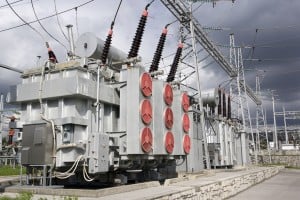For an updated glossary, please visit our FAQ page.
Alternating Current - current that reverses its direction of flow periodically (Hz).
Ampere - a unit of measure for the rate of current flow
Apparent Power - applied voltage multiplied by current in an AC circuit. This value would not take the power factor into account. Unit is volt amperes. (VA).
Balanced Load - AC power system using more than two wires, where the current and voltage are of equal value in each energized conductor.
Bandwidth - the range of frequencies over which an instrument provides accurate measurement
Billing Consumption - total amount of energy consumed during a predetermined period(usually 28-33 days).
Consumption (active energy) - actual electrical energy used measured in kilowatt hours (kWh) by the watt hour meter, regardless of the power factor.
Crest Factor - the ratio of the peak value of a wave form (voltage or current) to the RMS value.
Current Transformer - an instrument accessory which detects current flow without breaking
the circuit under test. An AC transformer, usually
step-down; typical ratio listing would be 1000:1. This would indicate 1000A on the primary and 1A on the secondary.
Current Transformer Ratio - the ratio of primary amperes divided by secondary amperes.
Delta Connection - a circuit formed by connecting three electrical devices in series to form
a closed loop; most often used in three-phase connections.
Demand (active, real or true power) - the power which is actually consumed by the load. The measurement takes the power factor into account.
Derating Factor - a number defined as 1.414 x average RMS phase current/peak phase current. This factor, when applied to the rated load of a transformer, gives an indication as to the percent loading that is reasonable when that transformer must service nonlinear loads.
Displacement Power Factor - the difference between apparent power and true power when only the phase relationship of voltage and current at the fundamental are taken into account.
Distortion Factor (%DF) - total harmonic Distortion referenced the total RMS signal (THD-R).
Distortion Power Factor - the difference between apparent power and true power frequencies.
Frequency - the number of complete cycles of AC voltage which occurs during one second (Hz).
Harmonics - current or voltages which have frequencies that are integer multiples of the fundamental power frequency; common and sometimes dangerous in nonlinear loads.
Heating Effect - temperature increase in electrical distribution equipment caused by an increase in RMS current.
Impedance - the total opposition to alternating current flow in an electrical circuit (Z).
Inductive Reactance - the force which acts as a resistance in an inductor to limit the flow of current. The force creates a leading power factor in AC circuits.
Initiator Pulses - electrical impulses generated from utility revenue meters. Each pulse indicates a specific number of watts consumed. These pulses are used within energy analyzers to measure energy consumption and demand.
K Factor - a number based on the harmonic content of load current that determines the maximum safe loading on a power source.
K-Rated Transformers - a transformer that is rated or designed to serve as the source for a predefined capacity of harmonic current.
Peak Demand (maximum RMS power) - the highest average load during a specified time interval (kW).
Phase - time relationship between current and voltage in AC circuits.
Potential Transformer - an instrument transformer used to step down high voltage potentials to lower levels acceptable for the input of electrical test instruments.
Power Factor - the ratio of true power (watts) to apparent power (volt amperes). Expressed in decimal form, e.g. .98.
Ratchet Demand - determining the billing demand based upon a pre-established peak average
demand (usually at 75%, 80% or 100% of the pre-established peak).
Reactance - the opposition to current flow in an AC circuit introduced through inductance or capacitance.
Reactive Compensation Power - the reactive power to be applied to an AC network for power factor correction; adding capacitance in order to bring the voltage and current waveform in phase.
Reactive Power (kvar) - power which is actually “borrowed” from the load and returned to the power source each cycle; unused power.
Resolution - the smallest unit value that an instrument can measure.
Resonance - when the inductance in the system and the natural capacitance of the system, or added capacitors, form a tuned circuit resonant at one or more of the harmonic frequencies produced by nonlinear loads.
RS-232 - a computer interface connector used to connect serial devices such as instruments for information transfer.
Sensitivity - the smallest input that will provide a specified output.
Skin Effect - phenomenon in which high harmonic frequencies cause electrons to flow to the outer sides of a conductor, reducing its cross-sectional diameter, and hence its ampacity rating.
Sliding Demand - calculating average demand by averaging the average demand over several
successive time intervals, advancing one interval at a time.
THD (%THD, Total Harmonic Distortion) - the contribution of all harmonic frequency currents or voltages to the fundamental current or voltage, expressed as a percentage of the fundamental.
THDF (Transformer Harmonic Derating Factor) - method of calculating transformer derating established by CBEMA for phase-to-neutral loads.
True RMS - capability to accurately measure the value of AC voltage and current having a non sinusoidal waveform as well as sinusoidal wave forms.
Unbalanced Load - an AC power system using more than two wires where the current is not equal in the current-carrying wires due to an uneven loading of the phases.
Watt - the measure of real power. It is the power expended when one ampere of direct current flows through a resistance of one ohm.
Wye Connection - a connection of three components made in such a manner that one end of each component is connected; generally used to connect devices to a three-phase power system.
CLICK HERE to view Power Monitoring products Setra offers.



